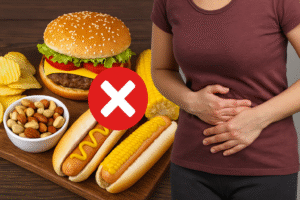Why Gout Needs Special Considerable Focus
Gout is a medically painful type of arthritis that manifests due to an accumulation of uric acid crystals in the joints particularly big toe, knees and ankles. The body’s metabolism of purines, which are complex organic substances, leads to the production of uric acid. While some medications can maintain the condition, the most important approach to prevent an attack while also limiting flare-ups is dietary alteration. In this guide, we highlight the most important foods to avoid for gout if you have gout and provide tips alongside a sample meal plan to make your life easier and painless.
What Is Gout And What Causes It?
Gout is the medical term for a condition that is part of a more broad umbrella term of disorders known as crystal-induced arthritis. Some form of elemental crystals lead to the condition and it’s directly linked with the way the body metabolizes uric acid. Primarily, uric acid is gotten rid of through urine. If the body generates excess uric acid or does not get rid of it efficiently, it crystallizes and settles in joints, causing severe inflammation and pain.
What to Avoid Eating When Suffering From Gout?
Foods to Avoid with Gout
- Red meats (beef, lamb, pork)
- Organ meats (liver, kidney, brain)
- Shellfish and oily fish (sardines, mackerel, anchovies)
- Sugary foods and drinks
- Alcohol (especially beer and hard liquor)
- Processed foods with high sodium and trans fats.
These are some of the top foods to avoid for gout sufferers because they significantly raise uric acid levels and contribute to painful flare-ups.
1. Foods with High Purine Content.
Purines are natural substances, and are present in varied foods and ingredients. Some foods to avoid for gout due to their high levels of purines should simply be avoided by people who suffer from gout. Organ meats like liver, kidney, and heart contains very high levels of purines, and so does red meats such as beef, pork, and lamb. They should also be eaten sparingly if at all. A wide range of seafood also contains purines. It includes sardines, mackerel, mussels, and anchovies, all of which are linked with more frequent gout flare-ups. Sugary Foods and Drinks: A Hidden Risk
A lot of people tend to ignore sugar, however, fructose especially from processed sources is very dangerous when it comes to gout flare-ups.
Take Care to Avoid:
- Diet “Soda” or Fruit Punch
- Iced Tea Sold in Stores
- Candy and Chocolate Bars
- Sweet Pastries, Muffins, and Cookies
- Yogurts with Flavors
Tip: Look for labels that say, ‘no added sugar’ or ‘fructose free.’ Use stevia when a natural sweetener needs to be added. The Effect of Alcohol on Gout Flare-Ups
The kidneys are responsible for processing uric acid, and dehydration, which is often caused due to alcohol, is one of the main triggers for gout attacks.
2. Worst Alcoholic Drinks to Take When Suffering from Gout
- Beer: Contains both Social Alcohol and Purines
- Spirits: High concentration limits excretion of uric acid.
- Cocktails: Excessive amount of sugar and alcohol.
Safer Choice:
Dry white or red wine, however needs to be consumed in severe limitation (consult your doctor first).
3. Inflammation Prone Processed and Packaged Foods
Aside from having a purine content, processed foods also contain a lot of sodium, preservatives, and unhealthy fats. All of these contribute to inflammation. These are also common foods to avoid for gout sufferers.
Try to Avoid or Limit:
- Packaged chips and other snacks
- Fast food burgers, fried chicken, pizza.
- Frozen entrees as well as instant ramen noodles.
- Stored bottled sauces and dressings.
Preferred: prepare homemade meals with whole ingredients and add spices or herbs for taste.
Can vegetables cause gout flare-ups?
It’s possible that some vegetables are high in purines, although they usually do not increase uric acid levels much.
Use Moderation With:
- Asparagus
- Cauliflower
- Mushrooms
- Peas
- Spinach
Fact: Research indicates that purines from plants don’t increase the chances of developing gout as much as those from meat. Gout-Friendly Meal Plan (1-Day Example)
Below is an illustrative day of eating designed to enjoy tasty food while minimizing the risk of gout.
Breakfast
• Oatmeal topped with fresh cherries and almond milk.
• Black coffee without sugar.
Lunch
• Grilled chicken with salad drizzled with lemon-olive oil dressing.
• Sparkling water.
• Whole grain roll.
Dinner
• Baked salmon (choosing tofu for a plant-based alternative).
• Brown rice with steamed broccoli on the side.
• Dessert consists of sliced watermelon or grapes.
Snacks
• Unsalted nuts.
• Low-fat yogurt.
• Carrot sticks with hummus.
What You Can Eat With Gout
Understand the foods to avoid for gout is half the work. Now focus on what you can enjoy.
Gout-safe foods:
• Dairy in moderation: milk, yogurt, cheese
• Whole grains: oats or brown rice
• Non-starchy vegetables: leafy greens
• Fresh fruits: especially cherries, apples, or berries
• Water in abundance
• Coffee or green tea
Summary:
Take control of gout through diet by learning the right foods to avoid for gout and replacing them with supportive alternatives.
Key Takeaways:
• Sprains from high uric acid, which is often caused eating purine dense foods.
• Processed foods should be limited to lower inflammation.
• Sugary drinks and alcohol are most important foods to avoid for gout.
• Shift focus to a low-purine plant based diet with plenty of water, fruits, and whole grains
• Exclude red meats and organ meats, alongside oily fish—common foods to avoid for gout.
• It is possible to manage gout with small changes. While controlling and managing gout is a long-term process, strategically choosing what to eat can significantly lower flare-ups and allow a person to live with much less pain.
FAQs
Q: Can gout be reversed with diet alone?
A: While dietary choices have an immense positive impact on preventing attacks and controlling the symptoms, it is very unlikely that it will be able to ‘reverse’ gout in its entirety. A lot of people tend to require some form of medication along with a strict diet.
Q: Are tomatoes bad for gout?
A: Though tomatoes do not contain purines in high quantities, there are reports that suggest for some people, they can act as a trigger for flare-ups. Pay careful attention to how your body reacts.
Q: Is intermittent fasting okay for people with gout?
A: There are possibilities of spikes in uric acid levels when fasting. Always consult your doctor before starting any type of fasting program if you have gout.
Q: Can drinking water help during a flare-up?
A: Absolutely! Drinking water can aid in getting rid of uric acid, which does make it one of the strongest allies that a person can depend upon in these situations.








